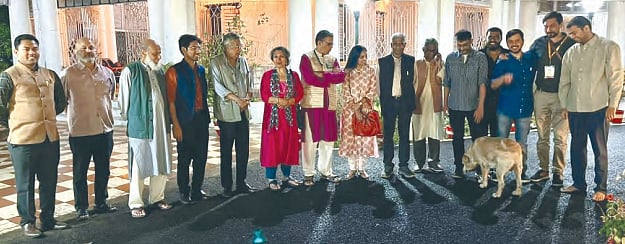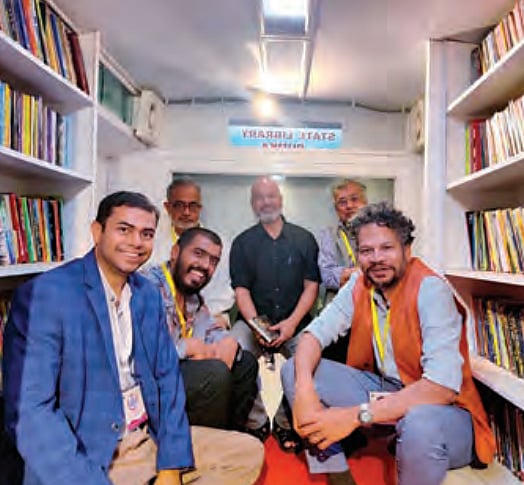‘Vocal for Local’ Gets a New Meaning
A restored book van from the 1950s turns into a mascot for a literary festival

The forests were aflame with the orange palash blossoms, a symbol of spring, as writers, poets, lyricists, conservationists, publishers, storytellers and forest officers converged from across India, and the district. All the rain-washed roads leading from Durgapur, Deoghar and Patna were bound for the 2nd Dumka State Library Literature Festival. The drive from the airport was picture postcard perfect—dense forests, wide river basins and scenic lakes.
From its humble beginnings within the precincts of Dumka State Library in April 2022 to the state-of-the-art Dumka Convention Centre in March this year, the festival has grown and acquired an identity of its own. Dumka has been the headquarters of the Santhal Pargana region in Jharkhand since the Santhal rebellion of 1855.
In the last couple of years, it has organically grown into a hyperlocal centre for literary dialogue. What started off as intimate conversations with authors at the library and a memorial lecture in honour of Paul Olaf Bodding—a Norwegian missionary who came to India, and stayed in Santhal Pargana areas, archiving Santhali folktales and learning and disseminating Santhali grammar etc.—has now metamorphosed into a full-fledged literature festival with audiences of over 500 students and administrative officers every day, from in and around Dumka.
I spoke to the young man who set the ball rolling, Akshaya Bahibala of Walking Bookfairs fame, and he told me the story of how it all began.
Akshaya was working on a small library project in the district of Sundargarh with the then Collector, Nikhil Pawan Kalyan, in 2019, just before the pandemic struck. The campaign was called ‘Sundargarh Bahi Padha’ which literally means ‘Sundargarh, come let’s read’. The public would gather at the District Collector’s residence and participate in book reading sessions. Many people used this opportunity to meet the collector with suggestions and complaints. Then the pandemic hit and everything came to a halt. But the word spread and in late 2021, probationary IAS officer Dipankar Choudhary invited Akshaya to Dumka at the behest of Kalyan’s friend and batchmate, Ravishankar Shukla. Shukla was the Deputy Commissioner of Dumka and he wanted Akshaya to revamp their district library that had been set up in 1956.
The first thing Akshaya did when he reached Dumka was to start cleaning up the library campus and, in that process, discovered a vintage bookmobile from the 1950s hidden inside one of the garages where the night watchman lived. He realised that they would have to restore this literary mascot of the Dumka library for their readers. They reopened the library with plans of inviting local writers, as well as those from across the country, to do small intimate reading sessions. In those days only students and IAS hopefuls were using the library.
Chandrahas Choudhury was invited to read at the Dumka Library in early 2022. During that visit Akshaya and Chandrahas, with the full support of the DC of Dumka, Ravishankar Shukla, started planning the Dumka State Library Literature Festival, which was held in the summer of 2022.

Shukla says, “The idea to organise a literature festival had its roots in the idea of developing an existing state library, which had a glorious past since the 1950s. Initially it was limited to the development of the library as a space for those interested in reading. The discovery of the library on wheels, Bhramansheel Pustakalaya, motivated us to celebrate the tradition and thereby reignite the flames of literature, library, books and reading. Karn Satyarthi, DDC at that time, and Chandrahas Choudhury amongst others, helped in planning and made it possible to organise the inaugural literature festival. It was the response to the first event that has kept us going.”
The first festival took place within the library campus with the renovated bookmobile as the main attraction of the festival. People were clicking selfies with the bookmobile. It was as if the people came back to pay their respects and express their gratitude to the mobile library that had served people in so many neighbouring villages. Chandrahas reiterates, “The centrepiece of the library is the recently restored mobile ‘book van’ which was used in the 1950s to circulate books to readers in the villages around Dumka. Out of service today, it still stands as a potent symbol of the power of books to spread ideas and education to the masses, and the role of the state in enabling such an encounter. The literary festival might be thought of as an attempt by the present district administration to recreate such an environment of cultural exchange and literary debate in our own time.
“The festival is also special because the writers are carefully chosen to be able to communicate to the audience in Hindi—the first language of most of the audience—and to showcase the widest possible range of writers, both from within Jharkhand and across India, to the audience of Dumka. What is most pleasurable about the festival for me is the sense of immersion in a very vivid local world, something that many of the visiting writers also appreciate and cherish.”

One of the most charming rituals on the opening day of the Dumka festival was to introduce the speakers all together at the inaugural session. The list of speakers invited this year included celebrated authors like Geetanjali Shree, Manoranjan Byapari, Nilotpal Mrinal and Jerry Pinto, poet Gyanendra Pati, wildlife historian and conservationist Raza Kazmi, forest officer Satwik Vyas, and naturalist Bikram Grewal, along with young writers like Mihir Vatsa and Anukriti Upadhyay. Bollywood found itself in Dumka with the likes of Piyush Mishra, Pankaj Tripathi, Varun Grover, Zeishan Quadri and Hussain Haidry in attendance, some of whom chose to address the audiences via Zoom. Local writers, including Fulbright Nehru Scholar Joseph Bara, popular Santhali writer Chunda Soren Sipahi and storyteller Mahadev Toppo, drew massive audiences.
Geetanjali Shree set the tone for the festival at the inaugural session when she declared that if she hadn’t come to Dumka—the audience may or may not have missed her—but the loss would have been entirely hers. Jerry Pinto, who spoke on day two, stressed on the fact that not having words to express oneself is far worse than not having money.
Author Nilotpal Mrinal is one of the most sought-after voices from this region ever since his novel, Dark Horse, became a hit in 2017. His closing session at the festival saw a packed house. Nilotpal thanked Ravishankar Shukla and his colleagues in the administration for going beyond their call of duty and creating this space for literary discourse in Dumka.
Books clearly have the power to change lives, and the festival in Dumka (18–19 March) was an eye-opener as young school-going children raised their hands to ask two basic questions on what to write and how to get published. One of the other things that stood out was the absence of corporate branding. The festival is named after a district. With more than 750 districts in India, the organisers encourage us to dream of a day when each of these districts starts hosting a literature festival—promoting local writing, local food and culture. And lest you think we were just whiling away our time in literary deliberations, here are some solid numbers to consider—books worth Rs 1 lakh were sold in Hindi, English and Santhali during this two-day festival!
PS: I have made a mental note to come back and spend a weekend at the Massanjore dam nearby. Located by the famous Mayurakshi river, the forest rest house here has an Advani Suite dedicated to the BJP leader who had been in house arrest for over a month when his Rath Yatra was stalled by Lalu Prasad Yadav in 1990.
NEETA GUPTA is a publishing consultant with a focus on translations from and into Indian languages
Follow us on: Facebook, Twitter, Google News, Instagram
Join our official telegram channel (@nationalherald) and stay updated with the latest headlines
